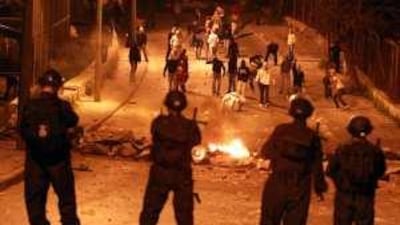RAMALLAH // With demonstrations and violence in several locations across the West Bank over the past two days, George Mitchell, the US Middle East envoy, is arriving in the region at a time of sharpening tensions. Palestinians and Israeli security forces clashed yesterday in Beit Ummar, a village near the city of Hebron in the southern West Bank, when demonstrators, protesting Israeli land confiscations and military closures, crossed an army checkpoint severing the village from a nearby road.
The protesters were met by soldiers firing tear gas and sound grenades, standard "riot dispersal" measures, according to an Israeli army spokesperson. Demonstrators said soldiers then "invaded" the village. Four people were reported injured. Yesterday's clashes followed a day of tension on Friday, when Palestinians and Israeli security forces confronted each other in Hebron itself and Jerusalem, as well as the village of Nabi Saleh, where a 14-year-old boy was shot in the face by a rubber bullet and remains in critical condition.
The Nabi Saleh demonstration was one of a series of grassroots protests against Israeli land confiscation that also play out weekly in Bili'in and Ni'ilin. In Jerusalem and Hebron, larger demonstrations were protesting an Israeli decision two weeks ago to include on a list of Israeli national heritage sites, the Ibrahimi mosque in Hebron and the Bilal Ibn Rabah mosque/Rachel's Tomb area near Bethlehem.
That decision had prompted Hamas to call for a new intifada in the West Bank. Israel blamed the group for stirring tensions with its public security minister, Yitzhak Aharonovitch, pointing fingers at "Hamas operatives" for the clashes on Friday at the Al Aqsa mosque compound in Jerusalem. After the main prayers, hundreds of protesters clashed with riot police, who stormed the compound, firing tear gas and sound grenades. Several dozen people were hurt in what was described by witnesses as the worst violence at the site in years. In an unusually sharp statement on Friday, Mahmoud Abbas, the PLO leader, accused Israel of trying to foment a "religious war" with what he called Israeli "police provocation".
Indeed, criticism of the Israeli action came from further afield with the Organisation of the Islamic Conference yesterday accusing Israeli police of sacrilege and calling for international intervention to "end Israeli aggression". Ekmeleddin Ihsanoglu, the secretary general of the Jeddah-based pan-Islamic body, said in a statement that Friday's fighting between Muslims and Israeli police, which injured dozens, was "a sacrilegious act of profanation of the holy Islamic site".
"The police action was "a violation of international law and a flagrant attack on the freedom of religion of the nature that could take the region into a war between religions," he said in a statement. This is the context that Mr Mitchell has to grapple with as he begins his quest to begin the indirect negotiations between the Israelis and Palestinians that the Arab League green lighted last week. Indeed, the PLO linked the recent tensions and the talks in a statement yesterday, accusing Israel of snubbing Arab willingness to support negotiations.
"[T]he ball is now in the court of the international community and the United States to take action in response to Israeli aggression and ensure a conducive environment for peace negotiations," Saeb Erekat, the PLO's chief negotiator, said. "This can only be done if Israel is held accountable to international law and its obligations under the road map, including a full settlement freeze and an end to violence."
Mr Mitchell was due in Ramallah last night for pre-talks with Mr Abbas in an effort to set the stage for the so-called proximity talks. The US, however, is understood to be unwilling to set clear terms of reference for the negotiations, a Palestinian demand, though Washington may be willing to apportion blame should negotiations fail, according to Israeli media reports. The Arab League decision to support indirect talks between Palestinians and Israel is widely seen as having provided cover for Mr Abbas, allowing him to accede to increasing US pressure to engage the Israeli government at a time when support for negotiations among Palestinians appears to be at an all-time low.
Israel has refused to enforce a full settlement construction freeze in all occupied territory, something the PLO is demanding as a signal of Israeli seriousness in talks. And few observers, Palestinian or Israeli, believe the current right-wing Israeli coalition government under Benjamin Netanyahu is able or willing to engage in a serious process. So sceptical are most Palestinians about Israeli motives that when one political analyst was asked to comment on the seriousness of Mr Netanyahu's motives in pursuing indirect talks she responded that she didn't realise she was expected to provide a "comedy answer".
In such a context, pursuing negotiations, even indirect ones, carries a risk for the Palestinian leadership. It seems possible that it is partly to counterbalance any negative reaction to the start of proximity talks that prominent PLO and Palestinian Authority figures have stepped up their support for the many demonstrations up and down the West Bank in recent weeks. These include Salam Fayyad, the Palestinian prime minister, who has attended demonstrations in Ni'ilin and Hebron, and Tayseer Tamimi, the top Islamic juror in Palestine, who was injured in Friday's protests in Hebron.
There seems little chance that a new intifada will break out in spite of heightened tension, at least in the short term. What happens down the road, however, will to a large degree depend on the efforts of Mr Mitchell and US mediation generally. okarmi@thenational.ae

